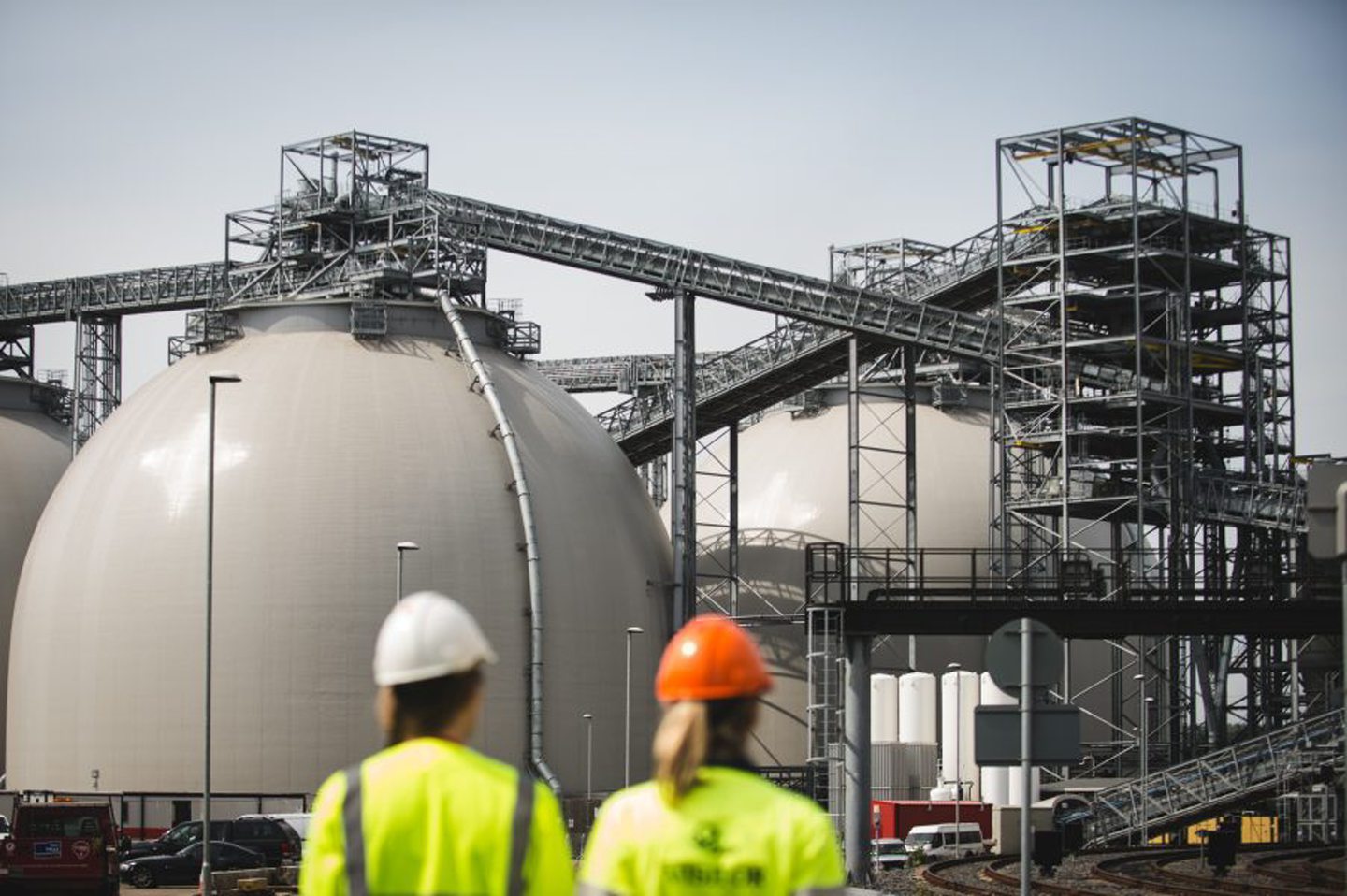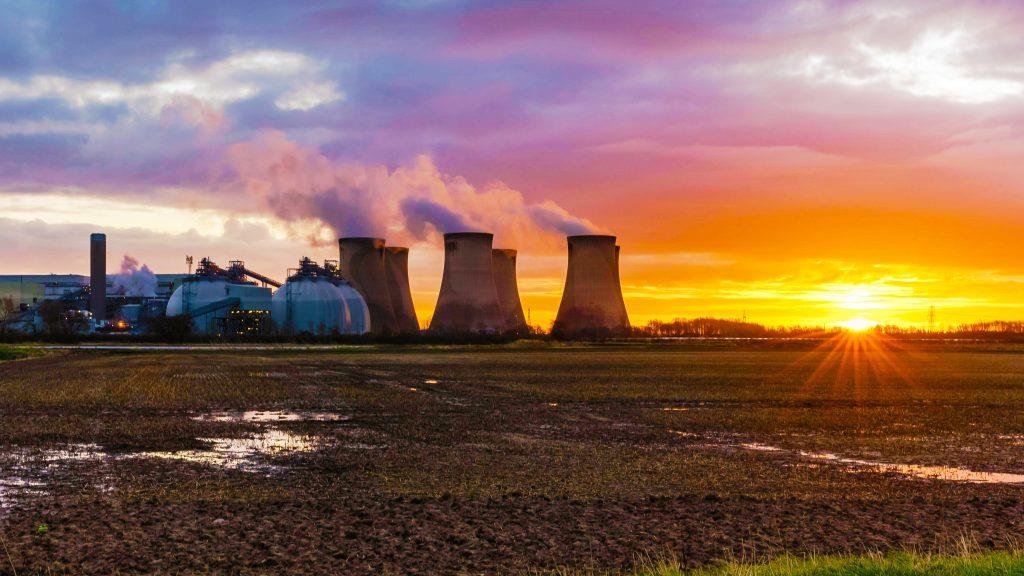UK Energy Secretary Claire Coutinho has approved plans for a carbon capture and storage (CCS) project for bioenergy units at Drax Power Station in Yorkshire.
In its decision letter, the Energy Secretary said the project would “make a meaningful contribution to meeting the urgent need for carbon capture storage infrastructure to support the transition to Net Zero by 2050.”
Once the most polluting power plant in Western Europe, Drax announced plans in 2019 to become “carbon negative” by 2030.
Central to those plans is its Bioenergy with Carbon Capture and Storage (BECCS) project, which received approval today.
The project involves installing post-combustion capture technology to capture carbon dioxide (CO2) emissions from up to two of the existing biomass units at the facility in North Yorkshire.
The biomass units burn wood from managed forests to generate electricity.
The captured CO2 will then be transported via pipeline and stored in offshore as part of the BP and Equinor-led Northern Endurance Partnership project.
Drax is part of the East Coast Cluster, a grouping of industrial emitters which was selected in 2021 to receive funding under the UK government’s ‘Track 1’ cluster process.
Encompassing “Britain’s historic engine room”, the ECC includes businesses associated with the Zero Carbon Humber and Net Zero Teesside initiatives.
The Humber region emits more CO2 than any other UK industrial cluster and the NEP, among several other CCS projects, aims to capture emissions across refining, petrochemicals, manufacturing and power generation operations.
The approval of the Drax project comes as the nascent offshore CCS sector continues locking in industrial partners.
8 million tonnes of CO2 per year
In a statement Drax said the decision to approve its BECCS project will enable Drax Power Station to “continue to play a critical role in supporting UK energy security”.
The company said Drax Power Station currently has four biomass generating units and produces around 4% of the country’s power and 9% of its renewable electricity.
The BECCS project will allow for the removal of approximately 8 million tonnes of carbon dioxide per year when both units are fully operational.
Recent analysis commissioned by Drax found delivering the BECCS project could, if implemented, “save the UK £15 billion in whole economy costs between 2030 and 2050”.
Drax said it plans to invest billions into the BECCS project, “subject to the right support from the UK government”.
Humber jobs boost
In total, the company said its plans could deliver up to 10,000 jobs in the Humber at the peak of construction as well as safeguarding 7,000 direct and supply chain jobs.
Drax said it will aim to source up to 80% of the necessary materials and services to develop the BECCS project from UK businesses.
In response to the approval announcement, Drax Group chief executive officer Will Gardiner said: “The DCO approval is another milestone in the development of our BECCS plans, and demonstrates both the continued role that Drax Power Station has in delivering UK energy security and the critical role it could have in delivering large-scale carbon dioxide removals to meet Net Zero targets.
“We look forward to working with our supply chain and other partners over the coming years on the project which, when fully operational, will deliver secure renewable power and approximately 8 million tonnes of carbon dioxide removals per year.
“We welcome the ongoing development of policy support for BECCS and the anticipated launch of a consultation on a bridging mechanism for biomass generators to take them from the end of current renewable schemes through to BECCS operations.”
Questions over green credentials
Despite the “carbon negative” goal, the BECCS project has proven controversial with critics who questions the environmental credentials of biomass plants.
A recent BBC investigation found wood used in the Drax Power station had been sourced from primary forests in Canada.
The report led to UK energy regulator Ofgem opening an inquiry into whether Drax had breached sustainability requirements.
Meanwhile, a report released today by UK climate and energy think tank Ember called BECCS an “expensive gamble” and a “very risky proposition to the UK energy bill payer”.
The report estimated the BECCS could cost UK taxpayers £1.7 billion per year and called for Drax fund a trial to demonstrate “beyond reasonable doubt” it can deliver negative emissions.
Ember electricity transition analyst Tom Harrison said: “UK energy bill-payers have already given Drax billions to burn wood for electricity, a practice that is unlikely to be carbon neutral and in fact could be a significant source of emissions that contribute to climate change.
“If Drax’s BECCS project goes ahead, the UK energy consumer could be locked into decades of even higher bills without any guarantee that the negative emissions they are paying for are actually being delivered.”
Environmental campaign group ClientEarth called the Drax BECCS plans “magical thinking“, highlighting recent failures of the technology and questions over the feasibility of CCS projects.
Recommended for you



 © Supplied by Drax
© Supplied by Drax © Supplied by Drax
© Supplied by Drax © Supplied by Drax Group
© Supplied by Drax Group






